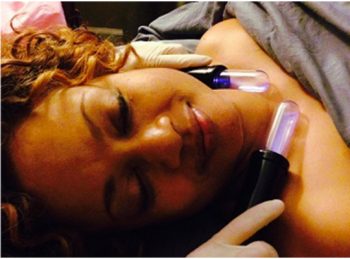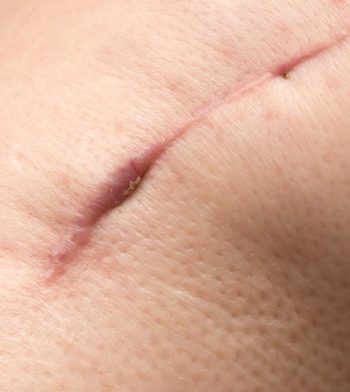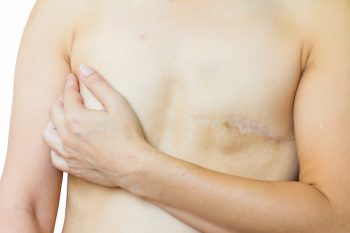Post-Mastectomy
Recovery Therapy
Clients frequently tell me that after having a mastectomy that they feel lost and without direction even though they may have had what is called a “successful surgery.”

No Warning of What Comes After Surgery
They say that no one ever tells them about what comes next – the swelling, the scarring, the tugging, the tightness that form across their chests and often limit the mobility of their arms. No one tells them that a task as simple as brushing one’s hair might be next to impossible – and that with the right help, it can be prevented.
It is sad that women are not told how to deal with the inevitable scarring that will result as a normal part of the healing process. During the first weeks following the procedure so much can be done to help the body lay down scars that are less restrictive and less noticeable.
Many surgeons are simply uninformed of how a clever combination of lymphatic drainage, specialized myofascial scar massage, cupping, and other various therapies can make a world of difference. I often hear that they never knew such services existed, and as you can imagine, getting our message out to doctors is very difficult. (Patients telling doctors about their positive experience is often a far more effective method than therapists trying to get an audience with a doctor who will listen.)
Different Types of Reconstruction
There are many types of reconstructive techniques that women frequently undergo following a mastectomy in order to restore the breast. Each type of reconstruction comes with its own healing challenges. Click here for a great video that explains the most common types of reconstructive surgeries. Regardless of what kind of reconstruction you have chosen, if any at all, I can help you get rid of your pain, swelling, and restore your normal range of motion.
If you have had a mastectomy, are planning a separate reconstruction surgery in the future, and are wondering when you should get therapy, the answer is the sooner, the better. By addressing the tightness and restrictions that happened after your mastectomy, you are preparing your body to be ready for the next surgery. It will be easier after the reconstruction to get back your normal range of motion if you have already worked on existing scars.
Here’s a helpful article about the 10 Commonly Asked Questions About Life After Breast Reconstruction Surgery.
Lymphatic Drainage
(a.k.a “Lymphatic Massage”)
The work that can be done to help heal the body following a mastectomy begins with the lymphatic system. Using either Manual Lymphatic Drainage (MLD) or Electro-Lymphatic Therapy, a Certified Lymphedema Therapist can move swelling out of the surgical area. This not only improves the pain associated with swelling, but it also carries away toxins from damaged tissues and facilitates nutrient delivery to the healing tissues.
Lymphatic Drainage, when done by someone who is a Certified Lymphedema Therapist (this is different than “lymphatic massage” that you would find with a regular massage therapist) can drastically speed healing times and produce a far better appearance post-operatively.

Lymphatic Drainage can begin within a few days following surgery.
You may wish to get clearance from your surgeon for this. Advise him or her that you will be seeing a Certified Lymphedema Therapist (CLT) for post-op lymphatic drainage (not “lymphatic massage” at a chain massage business where lymphatic “training” may consist of anywhere from a paragraph in a book to a single day of class – or even a single hour of class online with no practice on real people). Certified Lymphedema Therapists complete a minimum of 135 hours of rigorous training in lymphatic drainage and associated medical conditions.

Myofascial Scar Remodeling
Although it sounds a bit crazy, scars are a good thing. When the body experiences an injury like a surgical cut it begins to lay down fibers of collagen in a web-like pattern in order to hold the cut together – no matter which way the skin is tugged. It’s quite magical, actually.
The problem lies in the fact that the body’s only concern is to patch as quickly as possible, not as efficiently as possible. So, at a certain point, these collagen fibers going in all directions exceed their basic task of keeping things in place. When they go overboard (which they usually do) they cause constriction, lumpiness, puckering, and pulling. You see, the body is really good at acting quickly (within a second) after an injury to heal itself, but it is not so great at knowing when to stop.

In addition to the superficial scars that are visible, deep scars called adhesions can tack down tissue to organs and to bone. In the case of mastectomy scars, a special form of adhesion called webbing, axillary cording, or Mondor’s Cords can form in the armpit or on the trunk of the body.. This is what can limit your arm’s range of motion following a mastectomy.
This is where Myofascial Scar Remodeling
and Cupping can help.

As the body is putting down scar tissue, myofascial work and cupping can help organize it keeping tissues pliable and soft. It also helps to keep the scars from pulling on the incision site. Scar work is gentle and can begin as soon as 2-3 weeks post-operatively.
The earlier you begin, the better. The longer scar tissue is allowed to form, the harder it will be to get it loose and pliable.
If you’ve had a mastectomy recently or in the past, set up a session or call 505-554-5185 to find out how lymphatic drainage and myofascial scar release for remodeling can help you to feel less lost and regain control of your body.
Feel Better Today
With Lymphatic Massage and
Mastectomy-Recovery Therapy.




